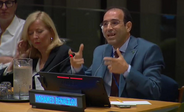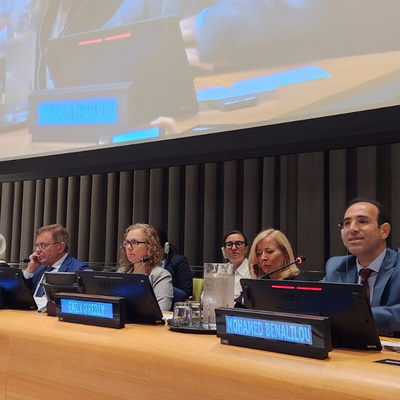Main output of the keynote of the Mediator of the Kingdom of Morocco, Mr. Mohamed Benalilou, during the High Level Panel on « Public access and inclusivity: developing strategic initiative to raise awareness on the role of Ombudsman and mediator institutions in the promotion and protection of Human Rights, good governance and the rule of law», held at the UN General Assembly Headquarters in New York on May 22nd, 2024 in implementation of the Article 11 of the UN GA Resolution 77/224 on « the Role of Ombudsman and mediatior institutions in the promotion and protection of Human Rights, good governance and the rule of law », issued on Decemeber 15th 2022.
The Mediator of the Kingdom of Morocco, Mr. Mohamed Benalilou, pointed out the missions and roles of the Institution of the Mediator such as defending rights, contributing to the rule of law consolidation, propagating justice and equity principles, divulgating moralization and transparency values, ensuring justice to public-service-users, in all cases where they suffer from damage caused by unlawful administrative conducts, vitiated by an abuse of power, or contrary to the principles of justice and equity, that such roles are deemed from the Institution’s perspective as missions which entail, when undertaken, to invoke the normative principles which govern Ombudsmen missions, namely Paris and Venice Principles, as well as the various UN GA resolutions, using multifold intervention tools and diverse influence means.
He stressed the fact that mediator institutions stand for a central mechanism to ensure "Human Rights effectiveness", while being keen on transforming a set of rights into "real and tangible" public-service benefits, as well as an observatory that detects the failing aspects, identifies the types of anomalies, their origin as well as their character, and suggests adequate solutions to redress them.
Mr. Benalilou also suggested that the grievances examination process should be transformed into a tool for exerting institutional pressure on the public administration to push it to abide by Human Rights obligations and bear into mind Human Rights when enacting laws or implementing public policies.
He also added that own-initiative investigation should be viewed as a Human Rights guiding tool, within the context of multiple approaches hinging on participation, accountability, non-discrimination, empowerment and legitimacy.
Moreover, he added that another mechanism, which is portrayed in the Human Rights assessment mission, is available through resorting to a "sorting out system" which classifies the lodged grievances according to the nature of the right involved in the grievance, rather than considering the grievances as mere facts isolated from their Human Rights domain;
Furthermore, the Mediator of the Kingdom stated that Ombudsmen institutions, through the Moroccan model, constitute a "connecting bridge" between governance and Human Rights, as well as between public-services delivery and their potential Human Rights field, and considered that the efficient implementation of any development model is bound to the public-service capacity to reorient its choices in order to serve the Human Rights issues.
On another spectrum, he argued that the Human Rights action has a horizontal character where every one is involved : I can confirm to you that we were able, with regard to the topic of "public-service governance and Human Rights" to draft a shared model which provides smart solutions in sofar as institutional coordination was concerned with the different Human Rights defense bodies, provided that every institution should maintain its strong attachement to their organizational independance as well as to the duty of defending their institutional identity; it goes without saying that there is a functional discrepancy, manifested through the sovereignty of the decisions made by each body within the context of the specificity of its prerogatives and objectives, however, this differenciation does not hamper to optimally invest the intersection of jurisdictions, as incorporating complementarity requirements in the strategic thinking of such institutions is likely to add important gains to the areas of their Human Rights action, provide additional support to the fashion in which they address complex and urgent issues, and likely to transfer this support from the layer of horizontal discourse even further to touching the Human Rights needs spontaneously expressed in the different aspects of its detailed dimensions.
Response of the Mediator of the Kingdom following the interventions made by the different representatives and delegates of the participating countries:
In his interaction with the different interventions and questions, Mr. Benalilou thanked the representatives and delegates of the present countries for their clear support for Ombudsman institutions, while noting that such backup is fundamental and necessary for Ombudsmen and mediator bodies to carry out their prerogatives and assume their responsibility in monitoring public policies, which must be designed while involving Human Rights requirements.
He added that if some talk about the independence and autonomy of Ombudsmen in their Statutes, it is noticed, on the contrary, we find in some legal systems that Ombudsmen institutions are removed, their prerogatives are narrowed down and their budgets are shrinking… Therefore, I deem that everyone is called to move from discussing the officially declared independence to reaching a real independence embodied in the Constitutions and laws and reflected in the daily practices in the fulfillment of the Ombudmen’s legal mandate.
On the other hand, as is well known, if the Venice Principles bestow upon Ombudsmen institutions a kind of immunity in carrying out their duties, it is high time we translate such immunity on the ground, it is also high time we make the future a new phase to strengthen Ombudsmen institutions around the globe.
With regard to the event’s topic, the Mediator of the Kingdom stressed the need to back up inclusiveness and accessibility to Ombudsman institutions, as institutions open to all walks of life, and considered that accessibility is a sinequanon condition to consolidate societal participation, propagate the practice of rights enjoyment, and even a fundamental element to strengthen democracy, to provide further transparency and accountability, and to ensure greater participation of the citizens.
He also was proud of the complementary role between the Ombudsmen institutions and the NHRI’s in strengthening and protecting Human Rights, as the event constitutes a great opportunity to call for further joint action in order to reach greater complementarity in this regard.
He also confirmed the fact that Ombudsmen’s commitment in favor of the defense of rights is a principled and constant engagement while invoking that the world currently goes through a critical Human Rights period, due to the ramifications of Artificial Intelligence and the requirements of the future generations.
He called for examining the best avenues to develop and enlarge Ombudsmen institutions’ mandates as well as to back up their roles throughout the world. In his capacity as IOI First-Vice President, Mr. Benalilou argued that it is high time, at the UN arena, to reshape the existing relationship between Ombudsmen institutions and the UN institutional Human Rights system through "redesigning such relationship" towards achieving further openness.
On the other hand, he asked for setting up "normative" concepts regarding accessibility and inclusivity for Ombudsmen when they carry out their missions while stressing, at the same time, the importance of institutionalizing immunity requirements that must enjoyed by all Ombudsmen around the world upon carrying out their Human Rights mandates.
Source: Mediator of the Kingdom of Morocco


